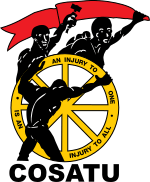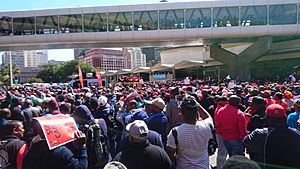Congress of South African Trade Unions facts for kids
 |
|
| Founded | 30 November 1985 |
|---|---|
| Headquarters | Cosatu House 110 Jorissen Street Johannesburg Gauteng |
| Location |
|
|
Members
|
2,193,965 |
|
Key people
|
Zingiswa Losi, President Solly Phetoe, General Secretary |
| Website | www.cosatu.org.za |
The Congress of South African Trade Unions, better known as COSATU, is a large group of trade unions in South Africa. A trade union is an organization that helps workers get better pay and safer working conditions. COSATU is a federation, which means it's a team made up of many different unions.
Founded in 1985, COSATU is the biggest of the three main trade union federations in the country. It is made up of 21 affiliated, or member, trade unions.
Contents
The Story of COSATU
How It All Began
On November 30, 1985, leaders from 33 different trade unions met at the University of Natal. They wanted to create one giant federation to unite workers. For four years, they had been talking about joining forces to fight against apartheid, a system of racial segregation and discrimination in South Africa.
COSATU was officially created on December 1, 1985. Some of the first members included the National Union of Mineworkers. Elijah Barayi became the first president, and Jay Naidoo was the first general secretary.
At their first meeting, they set several important goals:
- To create one union for each industry.
- To focus on the unfair treatment of women workers.
- To demand the release of all political prisoners.
- To ask other countries to put pressure on South Africa's government.
- To fight for the right for workers to strike and picket (protest outside a workplace).
- To set a national minimum wage, which is the lowest amount a worker can be paid.
In May 1987, COSATU organized a major strike where over 2.5 million workers stayed home from their jobs. The day after the strike, two bombs exploded in the basement of COSATU's main office, COSATU House. The building was badly damaged and became unsafe.
Fighting Against Apartheid
COSATU played a big role in the struggle to end apartheid. At their second national meeting in 1987, they adopted the Freedom Charter. This was an important document that described the kind of fair and democratic South Africa they wanted to build.
In 1989, COSATU called on its members to take part in a "sustained action" against apartheid. This led to the National Defiance Campaign, where people peacefully protested by entering places that were reserved only for white people.
After Apartheid
After apartheid ended in the early 1990s, COSATU continued to work for the rights of workers. By 2012, it had nearly 2.2 million members. Although its membership numbers have dropped since then, it remains a powerful voice for workers in South Africa.
Political Role
COSATU is in a partnership with the ANC, the ruling political party, and the South African Communist Party. This partnership is called the Tripartite Alliance.
This alliance gives COSATU a voice in the government. However, it can be complicated. Sometimes, COSATU disagrees with the government's policies and criticizes them publicly. This has led to debates within COSATU about how close it should be to the ANC.
Social Activism
Fighting HIV/AIDS
South Africa has been heavily affected by the HIV/AIDS pandemic. COSATU decided to take action and became a key partner in the Treatment Action Campaign (TAC). This group works to educate people about HIV/AIDS and fights for access to life-saving medicines.
In 1998, COSATU passed a resolution to campaign for treatment. They saw that many of their lowest-paid members were dying because they could not afford medicine. COSATU worked with TAC to pressure the government to provide these medicines to everyone who needed them.
Supporting Other Causes
COSATU also supports other movements for justice.
- Zimbabwe: COSATU has organized protests against the government in neighboring Zimbabwe when it believed human rights were being violated.
- Palestine: The federation has shown support for Palestinians. They have marched to the U.S. Embassy in South Africa to call for the recognition of Palestine's right to self-govern.
The COSATU Logo
The COSATU logo is full of meaning.
- The wheel represents the country's economy.
- The gold color of the wheel stands for the wealth of the nation.
- The three people pushing the wheel (two men and a woman with a baby) show the struggles of workers against unfairness based on race, gender, and economic status. They are black to represent the struggle of the majority against oppression.
- The red flag they hold is a symbol of the working class.
The slogan on the logo is "An injury to one is an injury to all." This means that all workers should stand together in solidarity.
Member Unions
COSATU is made up of many different unions, each representing workers in a specific industry. Here are some of its current member unions:
| Union Name | Abbreviation |
|---|---|
| Democratic Nursing Organisation of South Africa | DENOSA |
| National Education, Health and Allied Workers' Union | NEHAWU |
| National Union of Mineworkers | NUM |
| Police and Prisons Civil Rights Union | POPCRU |
| South African Commercial, Catering and Allied Workers Union | SACCAWU |
| Southern African Clothing and Textile Workers Union | SACTWU |
| South African Democratic Teachers Union | SADTU |
| South African Municipal Workers' Union | SAMWU |
| SASBO – The Finance Union | SASBO |
| South African Transport and Allied Workers Union | SATAWU |
Expulsion of NUMSA
In 2014, COSATU had a major disagreement with its largest member union, the National Union of Metalworkers of South Africa (NUMSA). The leaders of COSATU felt that NUMSA was not following the federation's rules.
On November 8, 2014, after a close vote, COSATU's leadership decided to expel NUMSA from the federation. The general secretary of NUMSA, Irvin Jim, called it "a dark day for workers." In protest, seven other unions temporarily stopped participating in COSATU's leadership meetings.
Current Leaders
As of 2025, the main leaders of COSATU are:
- President: Zingiswa Losi
- First Deputy-President: Mike Shingange
- Second Deputy-President: Duncan Luvuno
- General Secretary: Solly Phetoe
- Deputy General Secretary: Gerald Twala
- Treasurer: Freda Oosthuysen
See also
 In Spanish: Congreso de Sindicatos Sudafricanos para niños
In Spanish: Congreso de Sindicatos Sudafricanos para niños
- Trade unions in South Africa
- 1973 Durban strikes
- 2007 South African public servants' strike
- Siphiwe Mvuyane
- John Gomomo
 | Mary Eliza Mahoney |
 | Susie King Taylor |
 | Ida Gray |
 | Eliza Ann Grier |


